
EPIDEMIOLOGIC REVIEWS
Scope & Guideline
Navigating the Complexities of Disease Patterns
Introduction
Aims and Scopes
- Health Disparities and Equity:
The journal consistently addresses issues of health equity, particularly focusing on how factors such as race, ethnicity, and socioeconomic status influence health outcomes. It includes systematic reviews that analyze interventions aimed at reducing health disparities. - Methodological Advances in Epidemiology:
Epidemiologic Reviews emphasizes innovative methodologies in epidemiological research, including data visualization, simulation modeling, and statistical techniques to improve the robustness of findings. - Impact of Social Policies on Health:
The journal explores the intersection of health and social policies, examining how changes in policy affect population health outcomes, particularly in relation to vulnerable communities. - Infectious Disease Epidemiology:
A core area of focus includes the epidemiology of infectious diseases, with systematic reviews and analyses that contribute to understanding trends and outcomes in specific populations. - Mental Health and Chronic Conditions:
The journal frequently publishes articles that investigate the relationship between mental health, chronic conditions, and social determinants, highlighting the importance of comprehensive approaches to health.
Trending and Emerging
- Racial and Ethnic Health Inequities:
There is an increasing focus on the measurement and analysis of health inequities associated with race and ethnicity, highlighting systemic racism and its impacts on health outcomes. - Social Connectedness and Health Outcomes:
Research exploring the role of social connectedness in influencing health outcomes is emerging, underscoring the importance of community and social networks in public health. - Mental Health in Diverse Populations:
The journal is publishing more articles that address mental health issues within specific racial and ethnic groups, emphasizing the need for culturally relevant approaches to mental health care. - Innovative Data Measurement and Quality Improvement:
Emerging themes include the development of methodologies for improving data quality related to race and ethnicity in health research, reflecting a commitment to more accurate and representative epidemiological data. - Addressing Health Inequities in Digital Trials:
As digital health interventions become more prevalent, there is a growing focus on the challenges and solutions related to ensuring health equity in digital clinical trials.
Declining or Waning
- Traditional Epidemiological Methods:
There is a noticeable reduction in publications focusing solely on traditional epidemiological methods without integration of contemporary issues, suggesting a shift towards more innovative and interdisciplinary approaches. - Generic Health Interventions:
Research focusing on generic health interventions without a specific emphasis on population subgroups or social determinants of health appears to be declining, indicating a move towards more tailored and context-specific studies. - Generalized Policy Evaluations:
Articles that provide broad evaluations of health policies without addressing specific populations or co-occurring social factors are decreasing, reflecting a trend towards nuanced analyses that consider intersectionality. - Focus on Non-Communicable Diseases:
The attention on non-communicable diseases as isolated topics is waning, with a growing emphasis on their connections to mental health, social factors, and infectious diseases.
Similar Journals

Biomedica
Exploring the frontiers of molecular biology and medicine.Biomedica is a distinguished journal published by the Instituto Nacional de Salud in Colombia, dedicated to advancing knowledge within the fields of biochemistry, genetics, molecular biology, and general medicine. Since its inception in 1981, this Open Access journal has embodied a commitment to disseminating high-quality research, ensuring free and universal access to its published works. With an impressive Scopus Ranking—273rd out of 636 in Medicine and 148th out of 221 in Biochemistry, Genetics and Molecular Biology—Biomedica holds a Q3 category in both disciplines as of 2023, reflecting its growing impact and relevance in the scientific community. The journal welcomes contributions that further our understanding and lead to advancements in healthcare and biological sciences, serving as a critical resource for researchers, professionals, and students alike. The journal operates within a continuous publication model from 2001 to 2024, enriching the academic landscape with contemporary findings and fostering collaboration within the biomedical field.
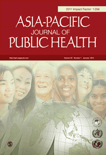
Asia-Pacific Journal of Public Health
Advancing public health knowledge across the Asia-Pacific.Asia-Pacific Journal of Public Health, published by SAGE Publications Inc, is a leading platform for disseminating scholarly research in the field of public health. With an impressive scope that spans from the late 1980s to the present, the journal offers a wealth of articles that address critical issues faced by diverse populations in the Asia-Pacific region. Categorized in the Q3 quartile for both Medicine (miscellaneous) and Public Health, Environmental and Occupational Health, it holds a significant position within its field, ranked 310 out of 665 in the Scopus database. Researchers and professionals have access to valuable insights that inform public health policy and practice, making this journal an essential resource for those aiming to enhance health outcomes in the region. While not currently open access, the journal's rigorous peer-review process ensures the integrity and relevance of its content. As the landscape of public health continues to evolve, the Asia-Pacific Journal of Public Health remains a vital resource for advancing knowledge, fostering collaboration, and promoting a healthier society.
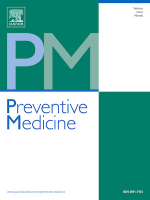
Preventive Medicine
Leading the charge in disease prevention and health promotion.Preventive Medicine is a premier academic journal published by Academic Press Inc Elsevier Science, renowned for its influential contributions to the fields of Epidemiology and Public Health. Since its inception in 1946 and through its dedicated issues leading into 2024, the journal has established itself as a leading platform for cutting-edge research, boasting impressive Scopus rankings, with a notable Q1 status across relevant categories. This journal provides an essential forum for scholars, practitioners, and policy-makers interested in the prevention of diseases and the promotion of health within populations. With each issue, it disseminates valuable insights on preventive strategies, health behaviors, and epidemiological trends, making it crucial for anyone invested in the advancement of public health sciences. The journal does not offer open access options, ensuring that content remains relevant and targeted to its scholarly audience. Given its valuable contributions and recognition in the academic community, Preventive Medicine continues to play a pivotal role in shaping evidence-based approaches to health promotion and disease prevention in modern societal contexts.

Central European Journal of Public Health
Exploring Health Dynamics Across Central EuropeThe Central European Journal of Public Health, ISSN 1210-7778 and E-ISSN 1803-1048, is a vital academic forum published by the NATIONAL INSTITUTE OF PUBLIC HEALTH, Czech Republic. With its comprehensive coverage of contemporary issues in public health and medicine since its inception in 1993, this journal aims to bridge the gap between research and practice, fostering a deeper understanding of health dynamics within Central Europe and beyond. As a Q3 ranked journal in both the fields of Medicine (miscellaneous) and Public Health, Environmental and Occupational Health as per 2023 metrics, it provides an accessible platform for innovative studies, policy analyses, and reviews that contribute to the global discourse on public health challenges. Though primarily based in the Czech Republic, it welcomes contributions from a worldwide audience, enhancing its scope and impact. Researchers, practitioners, and students will find invaluable insights that not only enrich academic scholarship but also inform effective public health interventions.
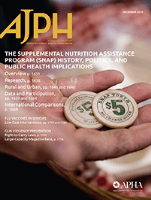
AMERICAN JOURNAL OF PUBLIC HEALTH
Bridging research and practice to enhance population well-being.The American Journal of Public Health, published by the American Public Health Association, stands as a cornerstone in the field of public health and epidemiology since its inception in 1949. With its rigorous peer-review process and a robust commitment to advancing knowledge and research practices, this journal holds a prestigious position in the academic community, as reflected in its 2023 Scopus ranking, where it is placed in the top percentile (93rd) within the categories of Public Health and Environmental and Occupational Health. The journal's focus encompasses a broad spectrum of public health topics, making it essential reading for researchers, practitioners, and students dedicated to improving population health. Subscribers can access invaluable insights through its collection of innovative studies and reviews, thereby reinforcing the journal's role in shaping public health policy and practice. By bridging research and real-world application, the American Journal of Public Health remains a vital resource for those engaged in the quest to improve health outcomes across diverse communities.

Lancet Regional Health-Western Pacific
Empowering Health Policies in a Diverse RegionLancet Regional Health-Western Pacific is a premier academic journal published by Elsevier, focusing on the diverse and dynamic field of health in the Western Pacific region. With an impressive Q1 ranking across several vital categories such as Geriatrics and Gerontology, Health Policy, Infectious Diseases, and Public Health, this journal is positioned at the forefront of health research and policy development. The journal aims to provide a platform for innovative research, reviews, and opinion pieces that lead to improved health outcomes and influence health policy across this geographically and culturally rich area. Offering open access to its content, Lancet Regional Health-Western Pacific ensures that the latest findings are readily available to researchers, professionals, and policymakers alike, ultimately contributing to the global discourse on health issues. As it continually strives to maintain rigorous publication standards, the journal serves as a crucial resource in promoting evidence-based practices and driving advancements in public health.
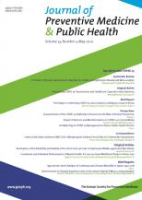
Journal of Preventive Medicine & Public Health
Connecting researchers to enhance public health strategies.Journal of Preventive Medicine & Public Health is a premier peer-reviewed open-access journal published by the Korean Society for Preventive Medicine, dedicated to advancing the fields of preventive medicine and public health. Established in 1968, this journal has carved out a significant niche in the academic community, reflected in its prestigious Q1 ranking in both Medicine (miscellaneous) and Public Health, Environmental, and Occupational Health as of 2023. With a focus on disseminating high-quality research, the journal serves as an essential platform for researchers, professionals, and students to share innovative findings and discuss contemporary challenges in health prevention strategies. The journal maintains a strong commitment to accessibility, offering open access to its content since inception, ensuring that critical research is readily available to the global community. The Journal of Preventive Medicine & Public Health not only contributes to the scientific discourse but also plays a pivotal role in shaping public health policies, making it an invaluable resource for anyone invested in the health sciences.

Health Promotion and Chronic Disease Prevention in Canada-Research Policy and Practice
Driving discussions to shape the future of health promotion.Health Promotion and Chronic Disease Prevention in Canada - Research Policy and Practice is a leading open-access journal published by the Public Health Agency Canada. This journal, indexed with the ISSN 2368-738X, is dedicated to advancing the field of health promotion while addressing chronic disease prevention in the Canadian context. Since its inception in 2008, it has gained a robust reputation, evidenced by its ranking in the second quartile (Q2) across multiple categories including Epidemiology, Health Policy, and Public Health, Environmental and Occupational Health. With its emphasis on research and policy implications, the journal serves as a critical resource for researchers, healthcare professionals, and students alike, aiming to promote evidence-based practices and driving discussions that shape public health policies. The journal is particularly noted for its triangulation of research findings into actionable strategies, making it relevant for both academic inquiry and practical application. Whether you are seeking to enhance your knowledge or contribute to the discourse on chronic disease prevention, this journal offers a platform for sharing impactful research and innovative ideas.
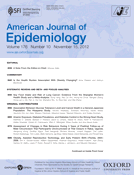
AMERICAN JOURNAL OF EPIDEMIOLOGY
Exploring the Frontiers of Disease PreventionAmerican Journal of Epidemiology is a premier peer-reviewed journal published by Oxford University Press, focusing on the advancement of epidemiological knowledge and methodology since its inception in 1921. With an ISSN of 0002-9262 and E-ISSN 1476-6256, this influential journal serves as a vital resource for researchers and practitioners worldwide, highlighting significant epidemiological findings and fostering dialogue within the field. Ranked in the Q2 category of Epidemiology and holding a commendable 80th percentile in Scopus' ranking, the journal continues to play a significant role in shaping public health policies and practices. Although the journal is not open access, it remains accessible through institutional subscriptions, ensuring comprehensive discourse on pressing epidemiological issues. By continuously publishing high-quality research that informs disease prevention and control strategies, the American Journal of Epidemiology stands at the forefront of epidemiological inquiry, promoting improved health outcomes on a global scale.
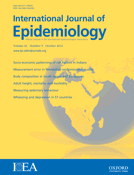
INTERNATIONAL JOURNAL OF EPIDEMIOLOGY
Championing evidence-based practices for public well-being.INTERNATIONAL JOURNAL OF EPIDEMIOLOGY, published by Oxford University Press, is a leading peer-reviewed journal established in 1972, dedicated to advancing the field of epidemiology and its applications in medicine. With an impressive impact factor and a Q1 ranking in both Epidemiology and Miscellaneous Medicine, this journal ranks among the top-tier publications in its category, reflecting its commitment to high-quality research and scholarship. The journal serves as a vital platform for researchers, professionals, and students to share innovative findings, methodologies, and insights in epidemiological science, thus contributing to the broader understanding of public health. The journal includes a diverse range of articles encompassing the latest trends and developments in the field, ensuring comprehensive access to essential information and promoting evidence-based practices. For those seeking rigorous academic discourse and the latest research, the INTERNATIONAL JOURNAL OF EPIDEMIOLOGY is an indispensable resource in the realm of health studies.